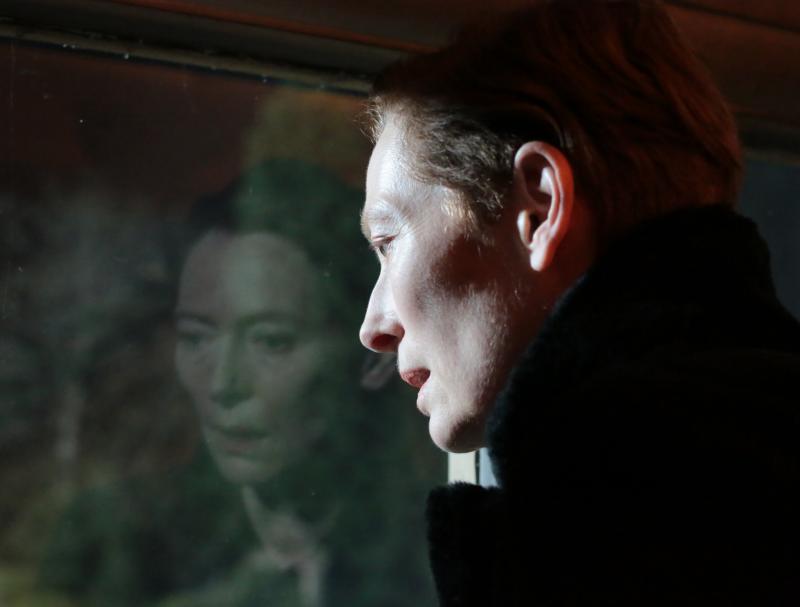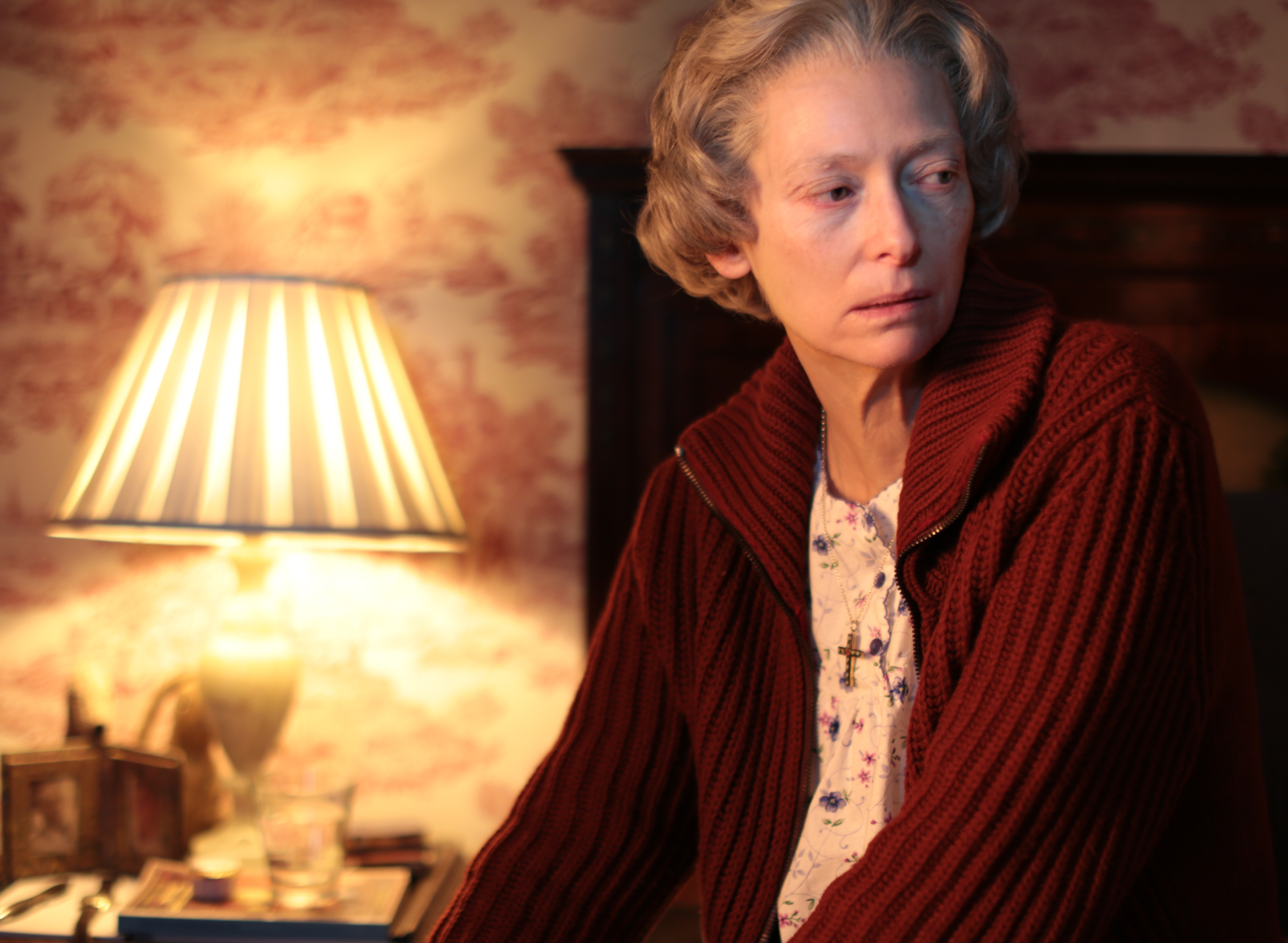The Eternal Daughter review - tricksy ghost story with a poignant emotional core | reviews, news & interviews
The Eternal Daughter review - tricksy ghost story with a poignant emotional core
The Eternal Daughter review - tricksy ghost story with a poignant emotional core
Tilda Swinton (and her dog) excel in Joanna Hogg's latest

Joanna Hogg has made a film that resolves itself backwards: what happens in the final reel recasts what you have just seen completely. It’s something of a departure from her previous films in style, but equally probing and moving.
The Eternal Daughter is the third Hogg film to feature a writer-director called Julie Harte, the lead character in The Souvenir I and II. Hogg explained at a recent Barbican Q&A that she had landed on making a film about her relationship with her mother back in 2008, after finishing her first feature film, Unrelated. But the outline she’d written for it remained in a desk drawer until after the first lockdown, when she decided to repurpose it as part three of a Souvenir trilogy.
Julie is now several decades older and played by Tilda Swinton, the mother of the original actor playing her; Swinton appeared as Julie’s mother, Rosalind, in the two earlier films, as she also does here (Swinton as Rosalind pictured below). But this double helping of Tilda Swinton brought Hogg a string of technical challenges. How to feature both characters in the same shot, without using a split screen or body double? Hogg also likes to let her cast improvise until she is happy with the outcome, which meant she had to help prep scenes herself; and her usual method of shooting in script order could only be retained by accepting long pauses while Swinton went through makeup and costuming to switch roles.
One split screen shot has ended up in the final cut, but for much of the time Swinton is alone in the frame, barring short appearances by a couple of minor characters — and a scene-stealing turn from her spaniel Louis, ably playing her mother’s dog. The material could have been left static, if not thin, by this approach, but Hogg has used the two women’s literal separateness from each other to serve her probing of the gap between them. Clever sound design with overlapping lines of dialogue makes scenes seem populated by both characters, while their solo lines to camera give the dialogue a confessional feel and a directness, as if the viewer is the person being addressed.
Swinton is superb at embodying these two very different women. Julie feels unworthy of her mother and spends half her time apologising to her and worrying about whether she is happy. She bites the varnish off her nails and jumps at every sound. In an aside to the dog, we see that Rosalind regards Julie’s heightened concern for her as “fussing”. Rosalind is the epitome of the fragrant Englishwoman, undoubtedly a beauty in her youth, now lightly permed and lined, delicate in her movements (such as her elegant way of picking up a small sleeping pill with a wetted finger from a little china box), yet a touch steely too.
The two women have come to an isolated Welsh hotel that was formerly the home of Rosalind’s aunt. She had spent a lot of time there in her childhood, and Julie hopes the house will arouse memories in her that she can build into a film, recording her, sometimes surreptitiously, on her phone when she starts revealing how the house is affecting her.
 Their dining-room conversations are regularly interrupted by a graceless young receptionist (Carly-Sophia Davies), whose appearances increasingly become a cue for humour, but also puzzlement: why is she so rude to paying guests? Is her moodiness connected in some way to her fractious relationship with the driver of the small car that comes each night to pick her up? Are there any other guests?
Their dining-room conversations are regularly interrupted by a graceless young receptionist (Carly-Sophia Davies), whose appearances increasingly become a cue for humour, but also puzzlement: why is she so rude to paying guests? Is her moodiness connected in some way to her fractious relationship with the driver of the small car that comes each night to pick her up? Are there any other guests?
This scenario would make a decent psychological study of the kind Hogg usually makes, all prickly relationships and social mis-steps, but it is not the film she has made. Which is a ghost story, of the kind we see Julie reading, Kipling’s “They”. Hogg gingers up the mix from the first seconds, where an eerie flute solo plays over the credits. We then watch a taxi driving through foggy woods towards a building Norman Bates would have felt at home in had he inherited a country-house hotel.
The flute music recurs regularly, accompanied by the sombre strings of Bartok’s Andante Tranquillo, ramping up the spooky atmosphere, as does the persistent fog. Bells toll, foxes bark, shadows flit across the hotel’s warren of corridors. You sense Hogg is ladling on the gothic touches with glee, as if to say: "You want a ghost story? Okay, here are all its standard trappings. Now see what I can do with them."
The rising tension seems ripe for delivering revelations and strange events. Julie’s mother talks of being frightened of the fireplace in the drawing room and claims they are staying in the exact same bedroom she used to sleep in. Other, sadder memories start to intrude. But whereas Rosalind claims to have learnt to “roll with the punches” in life, as has kindly night porter Bill (Joseph Mydell), grieving for his late wife, Julie is a mess: kept awake by elusive banging sounds and distant voices, unable to work. When she takes Louis for his night-time walks, she looks anxiously at the ground floor windows. Is there a ghostly presence there, and what does it want?
Tilda Swinton delivers two impeccable portraits, giving Julie a melancholic, careworn quality, driven by both love and regret; a woman who’s bogged down in trying to stage-manage every detail of her life, as she does her films. Rosalind is poised by comparison, repressed even, but poignantly sensing her encroaching frailty. Somehow Swinton engrosses us equally in the two characters and the twists of the emotional process they are playing out. The denouement is not wildly surprising, perhaps, but it’s clever and satisfying and very affecting. Sadly, Hogg's own mother died during the editing process and never saw the finished version.
rating
Explore topics
Share this article
The future of Arts Journalism
You can stop theartsdesk.com closing!
We urgently need financing to survive. Our fundraising drive has thus far raised £49,000 but we need to reach £100,000 or we will be forced to close. Please contribute here: https://gofund.me/c3f6033d
And if you can forward this information to anyone who might assist, we’d be grateful.

Subscribe to theartsdesk.com
Thank you for continuing to read our work on theartsdesk.com. For unlimited access to every article in its entirety, including our archive of more than 15,000 pieces, we're asking for £5 per month or £40 per year. We feel it's a very good deal, and hope you do too.
To take a subscription now simply click here.
And if you're looking for that extra gift for a friend or family member, why not treat them to a theartsdesk.com gift subscription?
more Film
 Beating Hearts review - kiss kiss, slam slam
Romance and clobberings in a so-so French melodrama
Beating Hearts review - kiss kiss, slam slam
Romance and clobberings in a so-so French melodrama
 Materialists review - a misfiring romcom or an undercooked satire?
Writer-director Celine Song's latest can't decide what kind of film it is
Materialists review - a misfiring romcom or an undercooked satire?
Writer-director Celine Song's latest can't decide what kind of film it is
 theartsdesk Q&A: actor Leonie Benesch on playing an overburdened nurse in the Swiss drama 'Late Shift'
The Guildhall-trained German star talks about the enormous pressures placed on nurses and her admiration for British films and TV
theartsdesk Q&A: actor Leonie Benesch on playing an overburdened nurse in the Swiss drama 'Late Shift'
The Guildhall-trained German star talks about the enormous pressures placed on nurses and her admiration for British films and TV
 Freakier Friday review - body-swapping gone ballistic
Lindsay Lohan and Jamie Lee Curtis's comedy sequel jumbles up more than their daughter-mother duo
Freakier Friday review - body-swapping gone ballistic
Lindsay Lohan and Jamie Lee Curtis's comedy sequel jumbles up more than their daughter-mother duo
 Eight Postcards from Utopia review - ads from the era when 1990s Romania embraced capitalism
Radu Jude's documentary is a mad montage of cheesy TV commercials
Eight Postcards from Utopia review - ads from the era when 1990s Romania embraced capitalism
Radu Jude's documentary is a mad montage of cheesy TV commercials
 The Kingdom review - coming of age as the body count rises
A teen belatedly bonds with her mysterious dad in an unflinching Corsican mob drama
The Kingdom review - coming of age as the body count rises
A teen belatedly bonds with her mysterious dad in an unflinching Corsican mob drama
 Weapons review - suffer the children
'Barbarian' follow-up hiply riffs on ancient fears
Weapons review - suffer the children
'Barbarian' follow-up hiply riffs on ancient fears
 theartsdesk Q&A: filmmaker Dag Johan Haugerud on sex, love, and confusion in the modern world
The writer-director discusses first-love agony and ecstasy in 'Dreams', the opening UK installment of his 'Oslo Stories' trilogy
theartsdesk Q&A: filmmaker Dag Johan Haugerud on sex, love, and confusion in the modern world
The writer-director discusses first-love agony and ecstasy in 'Dreams', the opening UK installment of his 'Oslo Stories' trilogy
 Oslo Stories Trilogy: Dreams review - love lessons
First love's bliss begins a utopian city symphony
Oslo Stories Trilogy: Dreams review - love lessons
First love's bliss begins a utopian city symphony
 Blu-ray: Two Way Stretch / Heavens Above!
'Peak Sellers': two gems from a great comic actor in his prime
Blu-ray: Two Way Stretch / Heavens Above!
'Peak Sellers': two gems from a great comic actor in his prime
 Late Shift review - life and death in an understaffed Swiss hospital
Petra Volpe directs Leonie Benesch in a compelling medical drama
Late Shift review - life and death in an understaffed Swiss hospital
Petra Volpe directs Leonie Benesch in a compelling medical drama
 The Naked Gun review - farce, slapstick and crass stupidity
Pamela Anderson and Liam Neeson put a retro spin on the Police Squad files
The Naked Gun review - farce, slapstick and crass stupidity
Pamela Anderson and Liam Neeson put a retro spin on the Police Squad files

Add comment